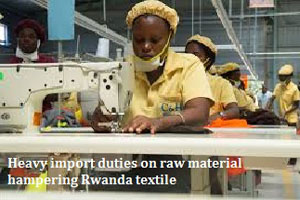
Rwanda textile industry hampered by heavy import duties on raw material
YarnsandFibers News Bureau 2016-08-30 15:00:00 – AfricaMade-in-Rwanda campaign launched in 2014 might be slowed down if more incentives are not introduced by the Government to promote locally manufactured clothes. As heavy custom duties are hampering the campaign as the Government moves to phase out used clothes, textiles manufacturers, according to industrialists.
They single out the 25 percent levy charged on imported raw materials on top of the 18 percent Value Added Tax (VAT). This, according to the textiles players, is one of the biggest challenge coupled with lengthy checks and bureaucracies, and high transport and transaction costs of both imported and exported materials.
Saidi Hitimana, assistant general manager of C&H Made in Rwanda, a garment and textile factory in Kigali Special Economic Zone, said that if the government could scrap taxes on raw materials, their company would be able to produce more than the current 7,000 vests and underwears it rolls out daily.
They are trying to increase their production capacity in a bid to best serve the vast market out there. But the cost at which they import raw materials, mostly from China, to make final fabrics continues to put a heavy toll on the business.
C&H Made-in-Rwanda and Utexrwa are the only two major textile industries in the country and demand is high, especially now that the Government is phasing out used clothes. They believe it can bridge the gap if exempted from those taxes.
The C&H Made-in-Rwanda that was operationalized in 2015 exports 80 percent of its products employs about 1,000 workers having increased from 200 in 2015. It targets to have about 5,000 workers by the end of 2017.
There are many upcoming small and medium enterprises in the garment industry that are yet to contribute significantly to the reduction of imported clothes.
Alex Ruzibukira, director-general of Industry at the Ministry of Trade and Industry, said that the Government was in talks with East African Community (EAC) member states to enforce policies that will see exemptions on some imported items and raw material.
A few months ago, they adopted a plan of action that exempts taxes on some of clothing materials such as buttons and zippers because they cannot be sourced locally. However, this will require adoption at the regional level. Technocrats in the EAC have been working on proposals which will be tabled before the upcoming Heads of State Summit.
Market Intelligence
Ask for free sample Report

experience
Customer Base
dedicated team
Countries Served Worldwide









